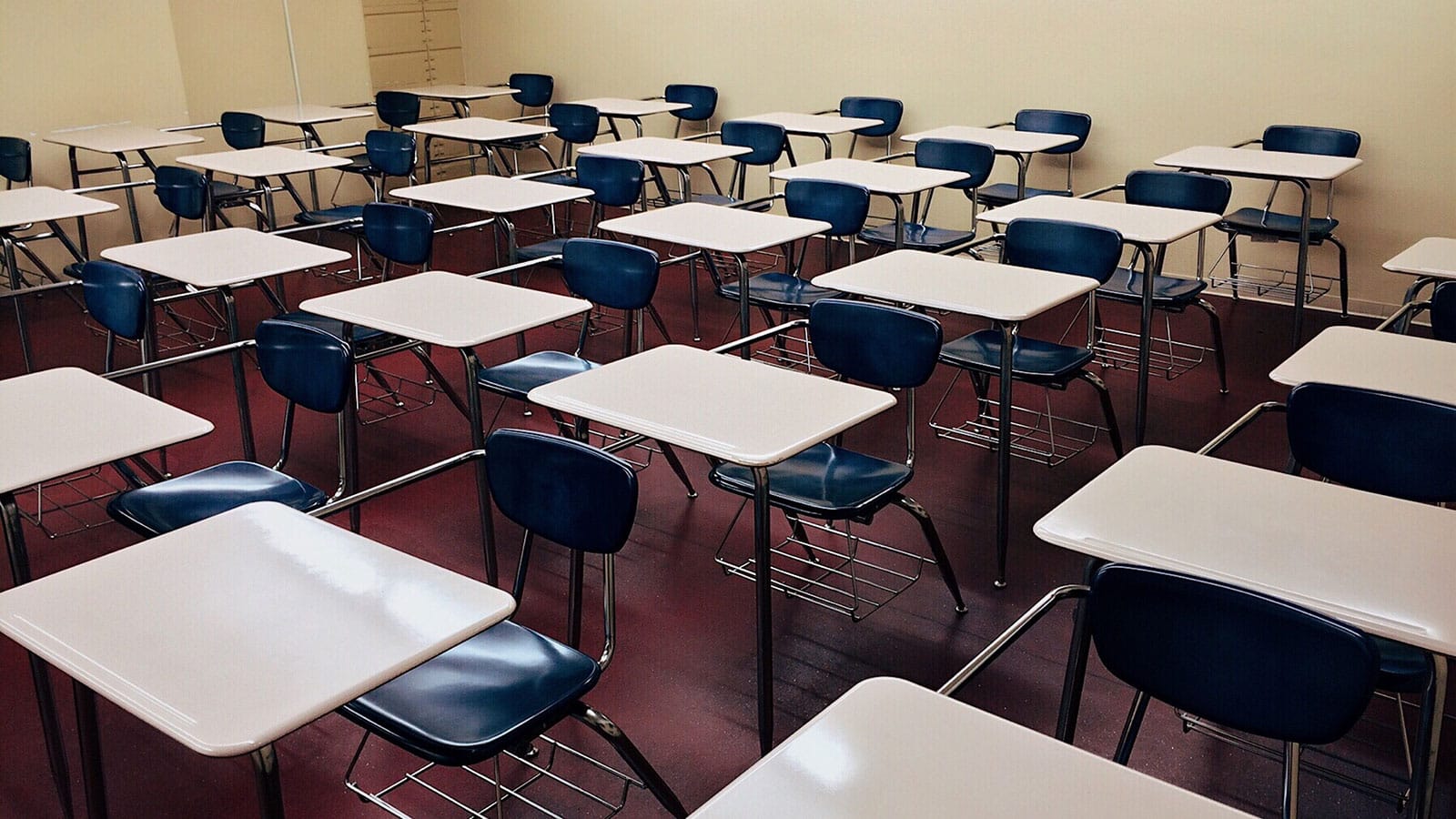Last Updated On: July 1st, 2024
What would you say are the qualities of a good student?
A willingness to not know. I think teachers can be better at creating an environment where it’s ok to not know. I think that is successful to varying degrees in schools.
You find out a student’s been struggling for months but they never came to you. And I feel like a lot of their reason is because “I don’t want to look dumb” or “I want to figure it out on my own.” But the more you are willing to admit what you don’t know, the more likely you are to ask questions and figure it out.
Students should try to see the big picture. As a teacher now, I wish as a student I had been better at seeing the bigger picture, but I don’t know if it’s realistic to ask a 15 year old to look at the bigger picture. But I think failing a test would have been the end of my world, where really it doesn’t matter. Or when kids are at a 97 and are busting their butt to get to a 99, you should spend your time somewhere else. It doesn’t matter if you’re doing it for the grades and transcripts. All that’s going to appear on the report card is an A or B. And an A is 90-100. So if you’re in it for the grade, even though I don’t love the students that are just like I’m going to do the bare minimum to get what I want, it’s actually an intelligent way of thinking about it.
A lot of this reminds me of the growth mindset. Have you read anything about that?
I haven’t, no.
Well, one, the idea that intelligence is not fixed. Which can actually backfire a lot for advanced and traditionally intelligent students is that being told “oh you’re so smart,” they learn that they’re good at that or that becomes part of their identity. But at the same time they’re learning that that’s something they have or they don’t. So the idea of a fixed mindset is, “I’m good at this” or “I’m not.” Ironically, the kids that have a lot of potential or aptitude are not the kids that will persevere the most because they’ve learned that, “oh I hit something that’s hard at the beginning that means I’m not going to be good at it.”
So knowing that mistakes and not knowing are part of the journey. That’s all a part of the growth mindset. That’s where education has been trying to go in the past.
What would you say has been the hardest thing about being a teacher during COVID?
Well the first thing that comes to mind is trying to or being expected to overcome the things that are not in my control. In terms of everything from the kid has been out sick all week, to the kid just had their uncle pass away, to this kid hasn’t shown up to class in weeks.
Or I’ve filed the form because I think this kid needs an IEP or needs some testing for something and the parent is not responding to “ok” that testing. Or I’m experiencing this in my classroom but the administration is so overwhelmed that they don’t have time to address that concern, even though I’m saying this is a problem, this is what we need to fix. I think there’s still the expectation that you have to try or you’re expected to do it anyways.
Aside from learning loss, have you seen any major consequences?
My principal of my middle school has been at the school for 25 years. He said discipline wise that this was the worst school year he’s ever seen. In the past kids would, for example, get into verbal spats etc. It would build to a fight. At the beginning of this year, one kid called another kid a 7th grader and that started a physical fight. Those social skills and emotional skills are not there. There’s more to handle than there would be in a normal year. And doing all that on top of all this learning loss…
Does your school teach any Social Emotional Learning?
I don’t know that structurally or systemically it’s there. I think individual teachers are taking it more on themselves and we’re realizing these kids can’t succeed until we meet them where they are or we engage them. Because I feel like when I was in school you listened to the teacher because you were supposed to. Also, I was an A student so I don’t know. Now I feel like there’s not this inherent, I have to listen to the teacher because they’re the teacher or I have to care about education because it’s education.
Absolutely. It’s so different now.
Yeah. There’s less automatic buy in. Part of it is in an effort to just get them to engage with their studies. Part of it’s like, let me talk about the things you care about so that you will be able to write an essay. The other part of it is, if there’s stuff going on in your life that you care about, that you care about to the point where you’re not going to listen to anything else, there’s nothing that I can do if I don’t address that first.
How would you advise students to approach AP classes versus honors classes?
I don’t believe in AP for the sake of AP. Back to the big picture, what puzzle piece is that fulfilling in your larger puzzle? Just like with the SAT or the ACT. It’s its own animal. I think sometimes people look at APs like that means you’re super smart. Now if the student wants as many credits in high school as possible because that’s something they’re motivated to do…but it’s if you’re going to major in stem, but take AP Psychology, my question is why are you taking AP Psychology?
What can parents do to advocate for their child in a way that lets the teacher know that they’re not going to overstep?
Well one thing I would say is just the approach in terms of questions rather than demands. Come in with this is what I’m aware of, this is what I’m concerned about. Just the awareness that the teacher comes in with their own perspective. Don’t believe everything your kid says. The student perspective is valid, but it’s one perspective out of many.
I think also teaching your kid to advocate for themselves. Like in high school, I feel like the kid should be emailing. And then if the kid is not getting a response, then the parent comes in.
Yes, I completely agree.
Vulnerability goes a long way with students. I think it can go a long way with parents too. And also I find it really helpful because as much as I see the kid and know the kid in their current moment in life, I don’t know the history, the experience they’ve had with other teachers, other schools, other parts of that subject, other habits, things going on in their home life, so any context the parents can provide me with that feels useful or relevant, whether it’s from the past or outside of school that might affect how they approach school, I find really helpful. Also, makes me better understand the kid. Instead of “Oh, this kid doesn’t want to do the work”, “Oh this kid is dealing with that.” Even though intelligently I know that, but to actually hear that from a parent creates more of an understanding.
How would you recommend dealing with a teacher that “hates them?”
Well the first thing I would say (meeting them in their language) is, do they hate you? Or do they hate some of the behavior and choices that you make? I would say can you pinpoint something you do that they don’t like. Figure out what they’re expecting. Don’t look at it as they hate you. You can’t change who you are, but you can change how you respond to the environment or the assignments, etc. to just get through it.
What if they said, “what can I do to get a better grade in your class?” In essence, masking the vulnerability that they’re not able to give you right now. They really want to know “what can I do to make you happy?”
Well anything that I’ve been telling them to do all year. Either they go back and read the syllabus before they ask that question or apologize for not knowing this and then ask or have a specific thing in mind. “I would like to redo this assignment because I saw I got a low grade on it and I think I can do better.” Come in with either specific questions or apologies and then general questions.
When do you typically reach out to students and offer one-on-one support?
I think it comes back to vulnerability. Even just going to office hours or showing a little bit of effort goes a long way. Because if I know a student is struggling at home or is taking care of their sister while their mom is at work, that’s vulnerability. And then I can work with that. It’s the same thing when they come to you for questions. That’s a form of vulnerability, saying “I don’t know.”
What’s some advice you’d give to your students?
Well it depends on the category of student.
I want to tell my honor students to chill out and live their life and I want to tell the kids that are struggling that this matters too. You’re going to have to do things that you don’t like. And I don’t want to be “that adult,” but you have to accept and find a way through the things that are hard or the things that you don’t like, especially to connect them to something else that you do like or want in the future.
Have agency in your choices. That can apply to the student to the student that is just doing everything to please their parents or doing what they think is going to reward them in society. And then they get to 25 years old and they’re miserable or broke. Make conscious choices, but with your own agency, not just what you think you should.
Photo by Pixabay




















